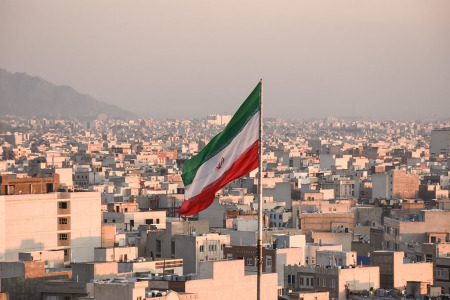Iran hangs 2 men on blasphemy charges amid surge in executions in Islamic country

Iran hanged two men sentenced to death for blasphemy amid a recent surge in executions in the country after the pair allegedly disrespected the Islamic religion.
Yousef Mehrad and Sadrollah Fazeli-Zare were executed at the Arak Prison in central Iran on Monday, the BBC reported. The pair were arrested in 2020 for allegedly running a Telegram channel called "Criticism of Superstition and Religion” and operating dozens of social media accounts "dedicated to atheism and desecration of the sanctities.”
The men were held in solitary confinement for the first two months following their arrests and were initially denied access to a lawyer.
Iran's Human Rights Activists News Agency (HRANA) said the Arak Criminal Court convicted Mehrad and Fazeli-Zare in 2021 on blasphemy charges and sentenced them to death. The two men also received six-year prison sentences for "running groups to act against national security.”
According to Al Jazeera, a news outlet run by the Qatari government, Mehrad was allegedly filmed burning a copy of the Quran, the central religious text of Islam, as initially reported by Iran’s state-run news channel AlAlam. Members of the pair’s Telegram channel also reportedly expressed disagreements with Islam, with one member admitting to having burned religious books.
The United States Commission on International Religious Freedom (USCIRF) condemned blasphemy laws in a Monday press release. These laws punish individuals who allegedly disrespect religious doctrines or symbols. USCIRF contended that such laws undermine the right to freedom of religion and freedom of expression.
“Blasphemy prosecutions demonstrate a blatant disregard for human rights, and are often used to target members of religious communities and others who hold different or dissenting views,” USCIRF Chair Nury Turkel stated.
“It is outrageous that the Iranian government executed Yusef Mehrdad and Seyyed Sadrullah Fazeli Zare on charges of insulting the [Islamic prophet] despite an international outcry and telling Mr. Mehrdad’s family the execution had been stayed,” he continued.
News of the execution comes on the heels of a joint report on the death penalty in Iran for the year 2022, which was drafted by Iran Human Rights with the support of ECPM (Together Against the Death Penalty). According to the report, Iran carried out 582 executions in 2022, a 75% increase from the previous year.
The “surge” of executions followed massive unrest in Iran after the death of Mahsa Amini, a 22-year-old woman arrested by the Islamic Republic's "morality police" for wearing her hijab improperly. Iran’s dress code requires women to conceal their hair with a head covering.
Amini died on Sept. 16, 2022, after she was beaten to death, leading to protests that were eventually suppressed by a police crackdown.
In December 2022, the United Nations adopted a resolution to remove Iran from the Commission on the Status of Women (CSW) following the murder and subsequent unrest. The new Economic and Social Council resolution cleared Iran from the commission for the remainder of its 2022 to 2026 term, with 29 countries voting in favor of the decision.
The Social Council expressed concern over the Iranian government's actions since September 2022 "to increasingly suppress human rights of women and girls, using lethal force that has resulted in the deaths of peaceful protestors."
"Iranian women have clearly called for us, here at the United Nations, to remove Iran from the Commission on the Status of Women. It was a sensible request," U.S. Ambassador to the U.N., Linda Thomas-Greenfield, said in a statement. "Iran’s membership directly undermines the commission’s work. Its membership was a stain on our credibility."
In October, the U.S. Commission on International Religious Freedom called for a United Nations Commission of Inquiry on Iran after the country’s response to the protests reportedly resulted in the deaths of nearly 200 protesters, including at least 23 minors.
Samantha Kamman is a reporter for The Christian Post. She can be reached at: samantha.kamman@christianpost.com. Follow her on Twitter: @Samantha_Kamman





















